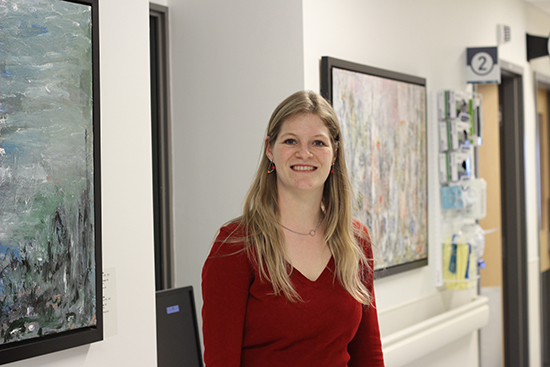Caring for families in mourning
Deborah Ummel is a psychologist with the Division of Supportive and Palliative Care Programs at the Royal Victoria Hospital of the McGill University Health Centre (MUHC). She is part of a dedicated team that guides patients and families through treatment, from pain management to rehabilitation, from survival to bereavement.

"There are many questions for family members at the end of life. Our meetings are decisive and full of humanity.” – Deborah Ummel, a psychologist with the Palliative Care and Support Program for Cancer Patients.
How did you discover palliative care?
Deborah Ummel: It was during an internship with the MUHC Palliative Care service, towards the end of my training in psychology. The experience affected me deeply: we meet with people at a crucial time in their lives, where we can be scared to feel the cold touch of death, but these moments are full of humanity and intensity. Sometimes we see a person only once, but the meeting will be significant and very touching. At the end of my internship, I wanted to stay and, as the psychologist of the unit had just retired, I had the opportunity to replace her.
What kind of support do you offer?
DU: We work as much, if not more often, with families than with patients because when patients are transferred to palliative care, they are already very sick and tired, sometimes even unconscious, and they are not always the ones who have the greatest need for psychological support. For their part, family members have a great need to be supported, because it is difficult to be the caregiver of someone who is dying. There may be conflicts to resolve, things to be forgiven. It can also be difficult to say goodbye to the loved one or know how to talk about death to a child.
Challenges and projects in cancer pain education
During National Palliative Care Week, the MUHC Supportive and Palliative Care Clinic invites its patients, their families and the community to the conference “Cancer pain education, current challenges and future projects”, presented by Cancer Pain Fellow Dr. Uri Hochberg.
Date: Thursday, May 11, 2017
Time: 1 p.m. – 2 p.m.
Location: Glen Site, 1001 Decarie Boulevard, room D02.1312
Light refreshments will be served
How do meetings with family members happen?
DU: We meet them while the patients are hospitalized and offer them a space where they can express their emotions, which are sometimes paradoxical. They may feel sadness, anger, guilt. Sometimes they are on the brink of exhaustion and may be anxious for the patient to pass away. It's very difficult. They need to be reassured and told that what they are experiencing is normal. We also encourage them to take care of themselves - not to forget themselves. They have the right to take a day off and not to be constantly at the bedside of the patient.
How do you ‘follow up’ on grief?
DU: It is variable. It can range from a few meetings to about a year in the most complex cases. Some people need only one or two meetings to explain to them the process of mourning, offer tools and normalize their experiences. Others may experience complicated grief and need more support to get through it.
What are the most difficult moments during bereavement?
DU: The first year is often the most challenging, because it will be the first time without the loved one; the first Christmas, the first birthday, the first Mother's Day. The trip around the calendar without our loved one, and each occasion can cause painful moments for those still alive.
